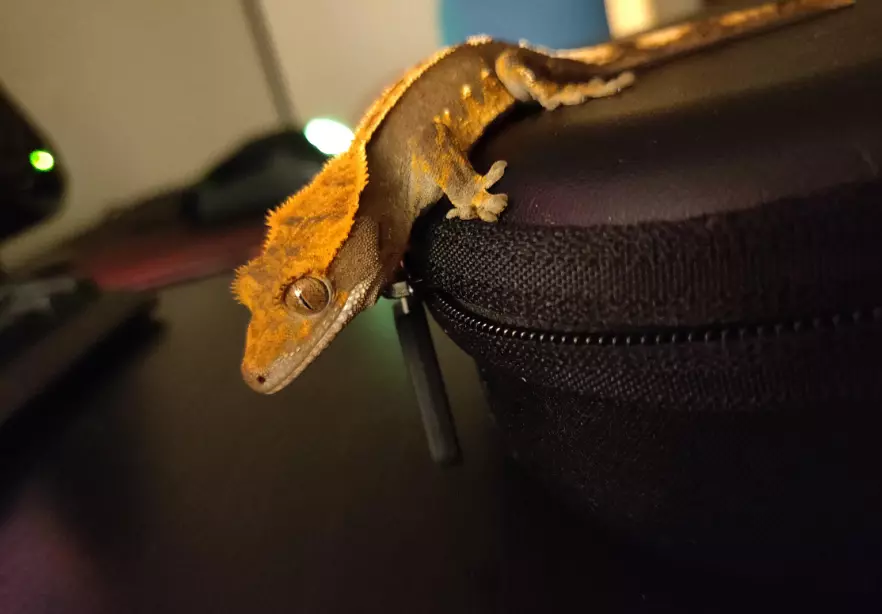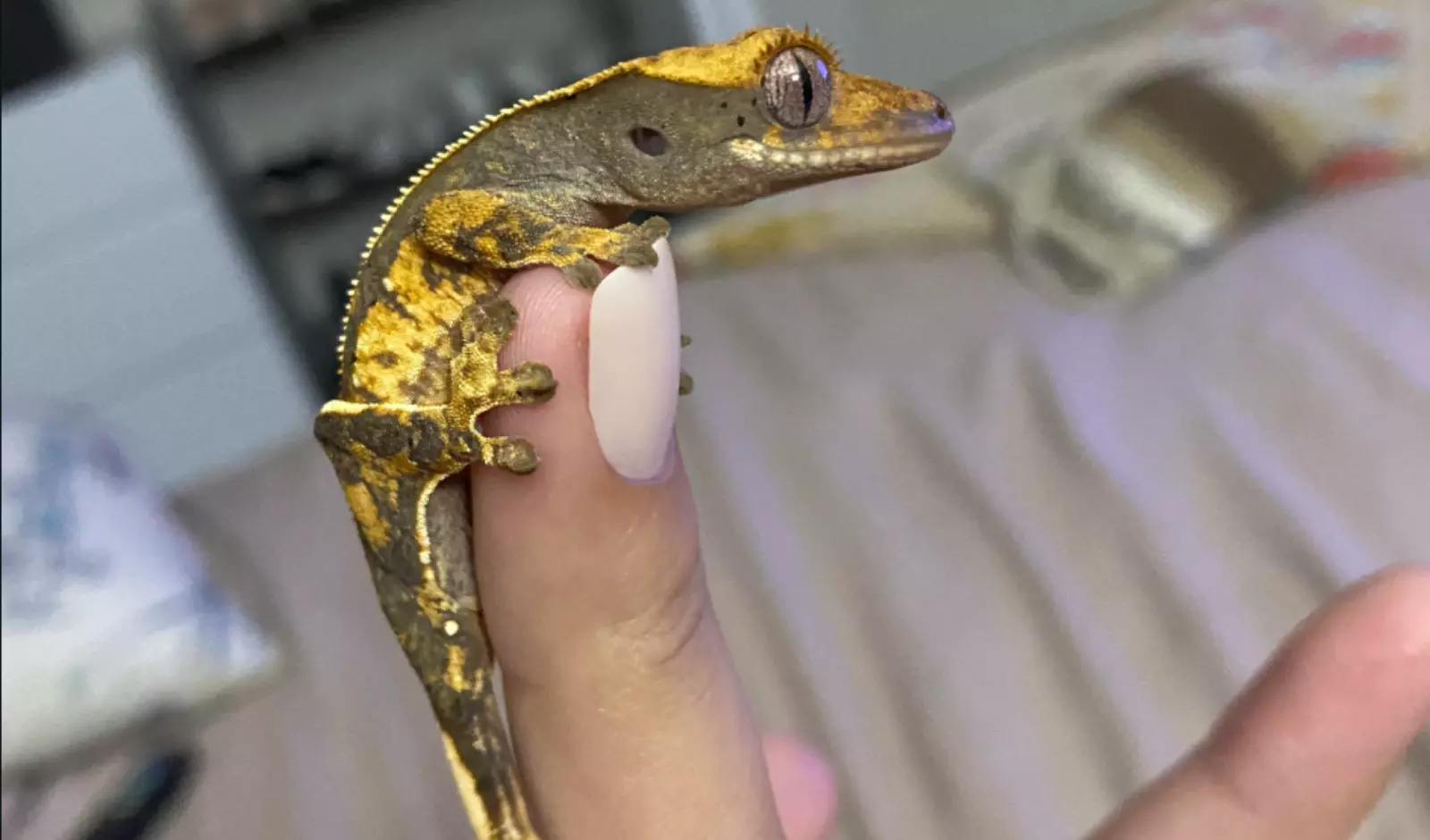Handling your crested gecko can be a great way to bond and socialize them.
However, not all crested geckos are eager to be handled.
Some may resist or even bite when you try to pick them up.
Why is that?
In this article, I will break down some possible reasons why your crested gecko is not letting you handle her and what you can do about it.
Let’s dive in…
Reason 1: Stress and fear

One of the most common reasons why your crested gecko may not want to be handled is stress and fear.
Crested geckos, in the wild, are basically on the menu for predators.
So, they’re naturally wired to stay away from anything that seems threatening.
When you try to pick them up, they might see your hand as a danger or something strange that makes them feel uneasy, and they might react by becoming defensive, aggressive, or shy.
Here are some signs that show they’re stressed or afraid:
- They hide most of the time.
- They make hissing or barking noises when you come near.
- They might try to bite or nip you when you touch them.
- As a last resort, they might even drop their tail.
- Their shedding or digestion might become irregular.
If you see any of these signs, it means your crested gecko is scared of you.

To help them feel more at ease, create a comfy and safe home for them.
First, make sure their enclosure is big enough. I usually go for a 12x12x18-inch size for one adult crested gecko.
Then, give them lots of hiding spots like plants, vines, cork bark, or coconut shells.
This will make them feel safe and private.
When you handle your crested gecko, be gentle and slow. Don’t grab them from above or behind, as it might make them want to run away.
Instead, let them crawl onto your hand or use a plastic cup to pick them up. Hold them close to your body or on a soft surface in case they decide to jump or slip.
Don’t handle them for too long or too often, as it can stress them out.
Start with short sessions of 5-10 minutes once or twice a week, and slowly increase the time as they get more comfortable with you.
One more thing: Be careful with sudden changes in light or loud noises that could scare your crested gecko. Use a timer or dimmer for their day and night cycles and keep their enclosure away from noisy or busy parts of your home.
Reason 2: Personality and temperament

Crested geckos are not clones of each other.
They have different personalities and temperaments that make them unique. Some may be more shy, curious, calm, active, or playful than others.
Some may enjoy being handled while others don’t!
For example, some may like to sit on your shoulder or head, while others may like to crawl on your arms or hands. Some may like to be petted or stroked, while others may not.
To respect and accommodate your crested gecko’s personality and temperament, you need to observe and understand their body language, preferences, habits, and moods.
Here are some tips:
- Watch how your crested gecko behaves in their enclosure. Do they hide a lot or explore a lot? Do they sleep a lot or stay awake a lot? Do they eat a lot or little? Do they shed well or poorly? These can give you clues about their personality and temperament.
- Watch how your crested gecko reacts to your presence and handling. Do they look relaxed or tense? Do they lick their lips or open their mouth? Do they wag their tail or curl it up? Do they move towards you or away from you? These can give you clues about their comfort level and mood.
- Try different types of handling and see what your crested gecko likes or dislikes. Do they prefer to be held in one hand or two hands? Do they prefer to be held high or low? Do they prefer to be held still or moving? Do they prefer to be held by you or someone else? These can give you clues about their preferences and habits.
Follow your crested gecko’s cues and signals. If they seem happy and relaxed, continue what you are doing.
If they seem unhappy or stressed, stop what you are doing and put them back in their enclosure.
If they seem bored or restless, try something new or different.
Reason 3: Health and wellness

Crested geckos can get sick or hurt just like any other animal.
If your crested gecko isn’t feeling well or comfortable, it may not want to be touched.
To make sure your crested gecko stays healthy, give them good food, clean water, supplements, regular vet check-ups, and proper care.
In my previous article, I explained how to feed your crested gecko a natural diet in detail.
I highly suggest reading that article to learn how to feed your crested gecko properly.
Tip: Take your crested gecko to a vet who knows about reptiles for check-ups and shots. If you see any signs of sickness or injury, get help from a vet right away. Don’t try to diagnose or treat your crested gecko on your own without professional advice.
F.A.Q.s
Q: How do I know if my crested gecko likes me?
There is no definitive way to tell if your crested gecko likes you.
But some possible signs are: they lick their lips when they see you, they come out of their hiding place when you approach, they climb onto your hand willingly, they stay calm and relaxed when you hold them, they make eye contact with you, they chirp or purr when you pet them.
Q: How often should I handle my crested gecko?
There is no fixed rule on how often you should handle your crested gecko.
But a general guideline is to start with short sessions of 5-10 minutes once or twice a week and gradually increase the frequency and duration as they get used to you.
However, you should also consider your crested gecko’s personality, mood, health, and schedule.


[…] can avoid biting by handling them gently, washing your hands before and after feeding and respecting their space and […]
[…] like changes in the environment, loud noises, improper handling, overcrowding, bullying, parasites, infections, or injuries can cause […]
[…] could be due to handling, unfamiliar surroundings, other geckos in the enclosure, or even loud […]